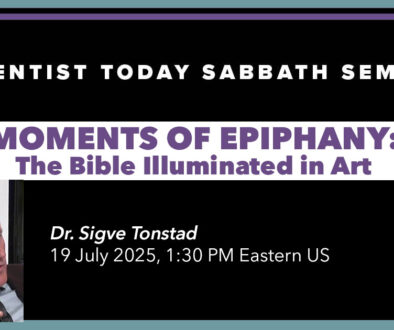ATSS: Bryan Ness on “Christians, Creation Care, and Climate Change”
25 January 2023 |
by Bryan Ness
Christianity, which heavily influenced Western culture, has been frequently blamed for being the cause of our current environmental crises. As acknowledged by Christians, when God created humans, He gave them dominion over all things: “God blessed them and said to them, ‘Be fruitful and increase in number; fill the earth and subdue it. Rule over the fish in the sea and the birds in the sky and over every living creature that moves on the ground.’” Genesis 1:28 (NIV). The Industrial Revolution, with its increasing reliance on technology and natural resource exploitation, is often viewed as a direct outgrowth of this Biblical injunction.
Christian theologians have frequently pushed back against this contention, arguing that the dominion given to humans in Genesis was not intended to be exploitative, but rather required that humans care for the earth as well. Written into the Levitical laws of the Old Testament are injunctions to care for nature, and many of the principles of Jesus also encourage creation care. The Psalms are also filled with rhapsodic descriptions of the natural world, implying that nature was to be valued and cared for in a loving and respectful way.
Regardless the theology of creation care, actions count more than expressed beliefs. A large majority of contemporary Christians say that caring for creation is important, but do their decisions about lifestyle and their support for environmental causes bear this out?
Surveys comparing the responses of Christians toward environmental issues with those of the general population show that in general Christians show a similar concern for issues like air and water pollution. However, when it comes to the biggest environmental challenge of all, climate change, Christians, and especially Evangelical Christians, show much less concern. A large percentage of Evangelical Christians say they do not believe that the earth is warming and that the climate is changing. Those Christians who believe that the end of the world is coming soon, and Christ’s return is imminent show even less concern about climate change. Why spend a lot of effort saving the earth when it is just going to end soon anyway?
The Adventist Church in the last 60 years has shown only mild concern about climate change. The topic is occasionally discussed in official church publications, with some lip service given, but little direct action by the church or its members is urged. There is evidence that many members of the Adventist Church, because of the perceived shortness of time, believe it is more important to spend effort on evangelizing than on preventing, or even paying much attention to, climate change. Many others, perhaps because they do not trust science, do not even believe that climate change is happening.
Ironically, many church beliefs about Christian duty, behavior, and lifestyle, if consistently applied, would help counter the effects of climate change. A strong historical emphasis on the value of the natural world and stewardship of its resources could drive the very actions we need to take as a society if we want to prevent climate change. The traditional values of living frugally and avoiding overindulgence could counter the destructive forces of consumerism. Adventist advocacy for vegetarianism, if put into more wide practice, would help reduce greenhouse gas emissions. It may be that our Judeo-Christian ethic as once manifested is to blame for our current crisis, but that a shift of emphasis to more environmentally responsible Judeo-Christian ethic could become a part of the solution to this crisis.
Teacher:
Bryan Ness teaches biological sciences at Pacific Union College.
Moderator:
Raj Attiken is retired as president of the Ohio Conference, now an adjunct professor at Kettering College.
How to join:
One-click link: https://us06web.zoom.us/j/88573541588
Passcode: GENESIS
ATSS starting time depends on where you are. If you’re on the west coast of the United States, it’ll be 10:30 AM. On the east coast, 1:30 PM. Please double-check the correct time where you live.
Times around the world:
-
- Reykjavík: 6:30 PM
- College Place: 10:30 AM
- Lincoln: 12:30 PM
- Denver: 11:30 AM
- Bracknell: 6:30 PM
- Berrien Springs: 1:30 PM
- Loma Linda: 10:30 AM
- Nairobi: 9:30 PM
- Gackle: 12:30 PM
- Hosur: 11:00 PM
- Waco: 12:30 PM
- Keene: 12:30 PM
- Helsinki: 8:30 PM
- Stockholm: 7:30 PM
- Hamburg: 7:30 PM
- Cape Town: 9:30 PM
- Madrid: 7:30 PM
- Paris: 7:30 PM
- Honolulu: 7:30 AM
- India (all): 12:00 PM (Sunday)
- Cooranbong: 5:30 AM (Sunday)
- Perth: 2:30 AM (Sunday)
The class is intended to last about 2 hours, though the conversation often continues to 4 PM (Eastern time).
About our class:
- The AT Sabbath Seminar is intended to be a courteous forum. We discuss and ask questions politely. We don’t accuse, get angry, put people down, or judge the state of their salvation.
- Stick to the topic in both comments and chat discussion.
- Make your comments and questions short—don’t dominate.
- Keep your microphones muted unless you are called upon to make your comment or ask your question.
- Indicate your interest in speaking by raising your electronic hand—under the “reactions” button.
- Please use your name when you sign in! Not your phone number, not your initials. This will help us differentiate you from unwelcome guests who want to disrupt us. You can set your name after signing on by clicking on the 3 dots next to your picture, which drops down a menu.
We look forward to getting acquainted with you!
Coming up:
- Maury Jackson
- Olive Hemmings
- Bill Cork




